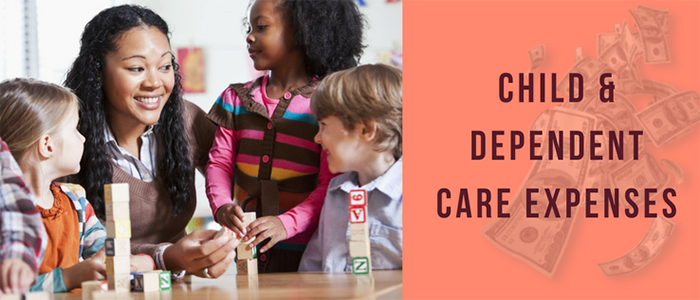Child and Dependent Care Expenses
Child and Dependent Care Expenses.Paying for day care expenses slowly and steadily becomes a large chunk of the household income. But there is very little that working parents can do about the same. The IRS understands your pain and that is the reason they let you take credit for such expenses. You can avail up to 35% of the total expenditure on childcare or daycare services, of course, subject to certain conditions.
Details of Expenses
In order to avail the tax credit, you must have a kid or adult who cannot take care of themselves and thus require such services. Also, you need to have a source of income to justify the need for such services.
The whole idea of this tax credit system is that the daycare services let you work.
The same is applicable if you attend school as well. If you are married, your spouse must either be working or attending school or looking for a job. If they stay back home, they would be able to take care of the dependents and thus the credit system does not hold good anymore. If your spouse is disabled and is unable to take care of the dependent, then you can avail the tax credits.
Dependent
To qualify as a dependent kid, your child must be younger 13 years. If he or she is more than 13 years and is unable to take care due to any form of disability, they also qualify as dependents. The rules do not allow you to take a tax credit for a dependent that does not stay with you for more than half of the year in question.
Some parents do not claim dependent care if they are divorced or separated. But they can still go ahead with child care credit.
It is applicable only to custodial parents and not everyone.
Day Care Services
The laws do not allow one of your dependents to be the care taker of another dependent to avail the credits. For an instance, you cannot have one of your elder kids look after your younger one and claim the same. Unless one of your children is not dependent on your anymore or is above 19 years.
It is easier to take help of professional day care services, where you do not have to go through a lot of questions.
Any day camps also qualify for such credits. However, if your spouse has claimed the credits you cannot claim it again.
Tax Benefits
If your daycare charges are up to $3000 for one dependent or $6000 for more than one dependent, you can avail the credits. The above are merely qualifying amounts and a certain percentage of it qualifies for credits.
For an example, if you have two dependent kids and the day care charges are $8000, only the first $6000 will qualify for the calculations.
Your income also plays a large role in the amount that is passed on as childcare or dependent care credits. The status of tax filing also plays a small role in deciding the tax credits. Calculations let you claim only the amount that you have spent or your actual income for that year. For an instance, you could have spent $6000 for day care expenses but have earned $4500 for that year. In such scenario, only $4500 is eligible for the tax credit.
Some employers provide compensation for day care facilities. You must deduct the same from your tax filing. Lastly, depending on your adjusted gross income the tax credit comes usually varies from 20 to 35% of your actual expenditure. There are no upper limits on how much you must earn to avail these benefits.


Recent Comments